Even the sound of the word “inflammation” is sinister.
We all know that inflammation is bad for us, but what does it really mean? How does it affect the body?
And what can we do about it?
What causes inflammation?
According to Harvard Health Publishing: “Inflammation refers to the immune system’s response to an injury or infection.”
When you get injured or sick-anything from a scrape, to a broken bone, to the flu-your immune system sends its troops (white blood cells) to heal the area. The influx of white blood cells causes swelling or inflammation. But that inflammation is temporary and healing.
Chronic inflammation is the body’s response to ongoing “threats” such as excess fat cells in the belly or fatty plaque inside arteries. It lingers for years, causing all sorts of problems.
Doctors say inflammation is the root of nearly every chronic health condition in the Western world:
– Heart disease
– Alzheimer’s disease
– Type 2 diabetes
– Cancer
– Autoimmune conditions
– Arthritis
The good news is that we can help our bodies heal. The foods we eat have a direct influence on the amount of inflammation in our bodies.
Foods that cause inflammation

No surprises here, but some foods are known to cause inflammation. Those well-known culprits include:
– Refined carbs, such as white bread and pastries
– Trans fats
– High-sugar foods
– Red meat
– Margarine and shortening
– Deep-fried foods
Yes, we love to eat ‘em, but they wreak havoc on our bodies, and we should limit these foods as much as possible.
Antioxidants and free radicals
But on the other side of the battlefield are helpful foods.
These foods do more than just prevent inflammation. They can undo its effects, heal the body, and even reverse aging.
How does it work?
Our bodies processes naturally produce “free radicals,” which cause cell damage that can lead to inflammation and disease. Many of the foods on the “do not eat” list actually cause the body to produce MORE free radicals.
Antioxidants (aka the good guys) remove free radicals from the body. It’s a simple formula: The more antioxidants, the less free radicals, and the less cell damage and inflammation.
Foods that reduce inflammation
The body creates some antioxidants on its own, but we can also get them from our diet. Vitamin C and E, for example, are well-known antioxidants.
The natural world is full of antioxidants. Scientists have studied them for years, and many of them are proven to fight specific diseases.
These ten foods are full of antioxidants, anti-inflammatory properties-and flavor:
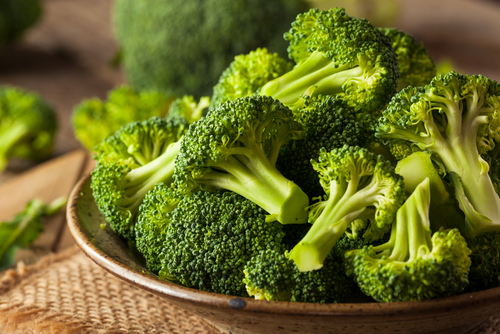
- Broccoli contains sulforaphane, an antioxidant that can calm inflammation and may slow the growth of tumors. Broccoli is but one example of a cruciferous vegetable. Cauliflower, brussels sprouts, kale, cabbage, and bok choy are also cruciferous and have many health benefits, too.
- Red grapes contain resveratrol, which can reduce inflammation and protect against heart disease. Red wine, in moderation, has the same healing properties.
- Green tea contains epigallocatechin-3-gallate (EGCG), which prevents inflammation and damage to fatty acids in your cells. We usually think of fats as harmful, but we need some fatty acids as building blocks, energy sources, and more.
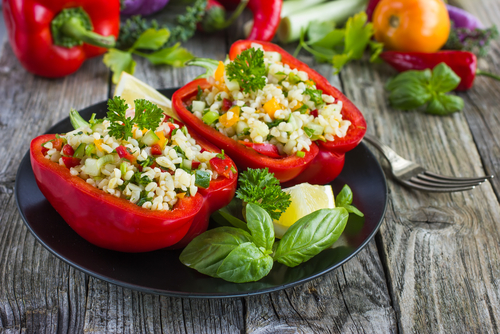
- Bell peppers contain quercetin, sinapic acid, ferulic acid, and other antioxidants. They also have vitamin A, vitamin C, potassium, fiber, folate, iron, and a delicious, sweet crunch.
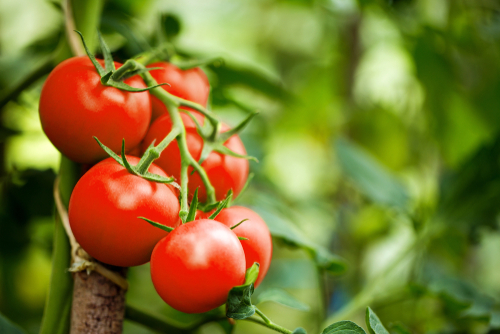
- Tomatoes contain lycopene, which lessens inflammation and reduces the risk of some cancers and heart disease. Other reddish foods like watermelon and pink grapefruit have lycopene, too.
- Olive oil contains oleocanthal, an anti-inflammatory compound shown to lower the risk of heart attacks, strokes, cancer, and other diseases. Olive oil has been singled out as the most effective part of the heart-healthy Mediterranean diet.
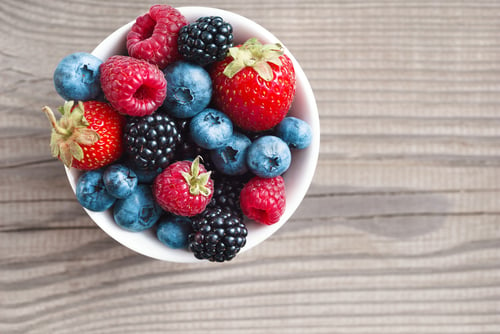
- Berries contain anthocyanins, antioxidants which can lower inflammation and risk of heart disease. Blueberries, strawberries, and cranberries immediately come to mind, but also consider more exotic varieties like acai or bilberries.
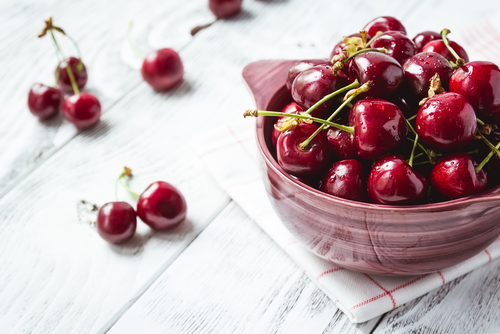
- Cherries contain antioxidants, such as anthocyanins and catechins, which fight inflammation, arthritis, and cancer. They also have fiber, potassium, calcium, vitamin A, and folic acid, so dig into your bowl of cherries.
- Fatty fish like salmon, mackerel, tuna, and sardines contain omega-3 fatty acids EPA and DHA, which have anti-inflammatory effects. They can lower the risk of heart disease, cancer, and arthritis.

- Dark chocolate has recently been shown to reduce inflammation and the risk of other diseases like high blood pressure. But, sadly, that’s not a blanket recommendation to binge on Hershey’s bars. Instead, look for chocolate that’s at least 70% cacao to get the benefits of the chocolate WITHOUT the added sugar. And even then, only a small square per day.
The best part is you probably eat many of these foods anyway.
And if not, you can look for ways to add them to your diet in smoothies, soups, or salads. Sub olive oil for vegetable oil whenever you can. And who needs an excuse to eat chocolate?
Good health is a choice! Fortunately, it can be a delicious one.





